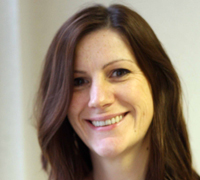
First up is Trinity Mirror Regionals' Alison Gow.
What is your job title and what does that mean?
Digital Innovation Editor, Trinity Mirror Regionals. I head a small team which works across our various newsrooms, trialling new ways of telling stories, engaging audiences and making our content richer, more shareable and rewarding for readers.
We also work with outside organisations or individual developers, to build or create things that we think could have applications for journalism.
How did you get started in the industry?
Straight from A levels, aged 18. I blagged a year's work experience on my local weekly paper with a £30 a week wage. By the end of the year, I had made enough mistakes to know I needed formal training and – luckily – enough cuttings and experience to get a job offer from a large weekly paper offering NCTJ indentures.
What do you most look forward to at the start of your day?
Coffee and the Slack or email ping that heralds the arrival of some link, video or file showcasing a new piece of creativity by the team.
What does a normal day look like for you? In emoji.

My day in emoticons is authentic, but very boring :(
What three tools or apps do you use the most for work?
Tweetdeck – for my searches, understanding the day's conversation, sharing information, procrastinating.
Google Docs – most of my work is done in Docs, whether it's scoping plans to making presentations or spreadsheet wrangling.
Slack – I'm a convert to this and I love how useful it is for group collaboration. Also, the mobile app is brilliant.
What would you focus on if you were training as a journalist now?
Social media – so I can find stories, grow networks, be a part of the conversations and best market my work.
Multimedia storytelling – so I am not limited to a particular way of presentation, and can tell a story in the most compelling, engaging way for the topic and for the audience.
Mobile – being able to capture a story on the go, and bring elements of text, image or video together to create a compelling piece for the reader (who is also most likely using a small screen) is going to be an increasingly vital skill.
What skills do you think are important to your role?
An ability to think around corners or see how things not necessarily linked to journalism can still be used to tell stories or engage people.
An ability to use social media well – I find so much through this, and learn lots. I've also connected to lots of people who have been really helpful with achieving ideas, either through Twitter, or Twitter contacts.If you want to be a general reporter, highlight your journalism qualifications but make sure you showcase your abilities in live blogging, social media (especially story-sourcing) and multimedia skillsAlison Gow, Trinity Mirror Regionals
An insatiable appetite to try out new apps or digital tools and see if they will work for storytelling.
Good current knowledge of legal/editors' code/IPSO issues - no matter what platforms, devices or shiny things come and go, these remain constants.
What has your current job taught you about the industry?
There are still people in influential positions in our industry who would quietly kick the plug out of the internet and call that a win, if they thought they could get away with it.
They talk good digital but don't promote good digital, and that can lead to a stifling of creativity in others.
What would you say to someone applying to work at your organisation?
I've been recruiting a lot recently, so this is with my shortlisting head on, having sifted probably 800-odd applications:
Look carefully at the job spec for the role you apply for and target your application accordingly. For example, if you want to be a general reporter, highlight your journalism qualifications but make sure you showcase your abilities in live blogging, social media (especially story-sourcing via social media) and multimedia skills – it marks you as a real all-rounder with skills that enhance the newsroom from the moment you join in.
Equally, if you are applying for a social media editor post, knowing that it doesn't begin and end with Twitter and Facebook, examples of stories you've sourced via social, or campaigns you've run, or events you've organised (such as a Tweet Up) all show you really live in the medium you want to work in.
Be detailed, specific and pack your application or CV with relevant details. You might be one of 200+ applicants and to be short-shortlisted (that's the "I want to interview these people"; the 'long-shortlist' is only "these applicants are interesting") you need to stand out as a professional. Get your application through in good time so employers have plenty of opportunity to see your work and consider you, rather than squeaking in under the deadline wire.
What is the best piece of advice you've ever been given?
The quote that has stayed with me over the years is "It is better to light a candle than curse the darkness". I've always had a view that things tend to be achievable with a bit of creative thinking, and I think it's especially true in digital journalism. There is so much we can achieve in online storytelling if we try things – not least discovering a way to fund the future of our industry.
Next week we will hear from Mitra Kalita, managing editor at the Los Angeles Times.
Free daily newsletter
If you like our news and feature articles, you can sign up to receive our free daily (Mon-Fri) email newsletter (mobile friendly).









